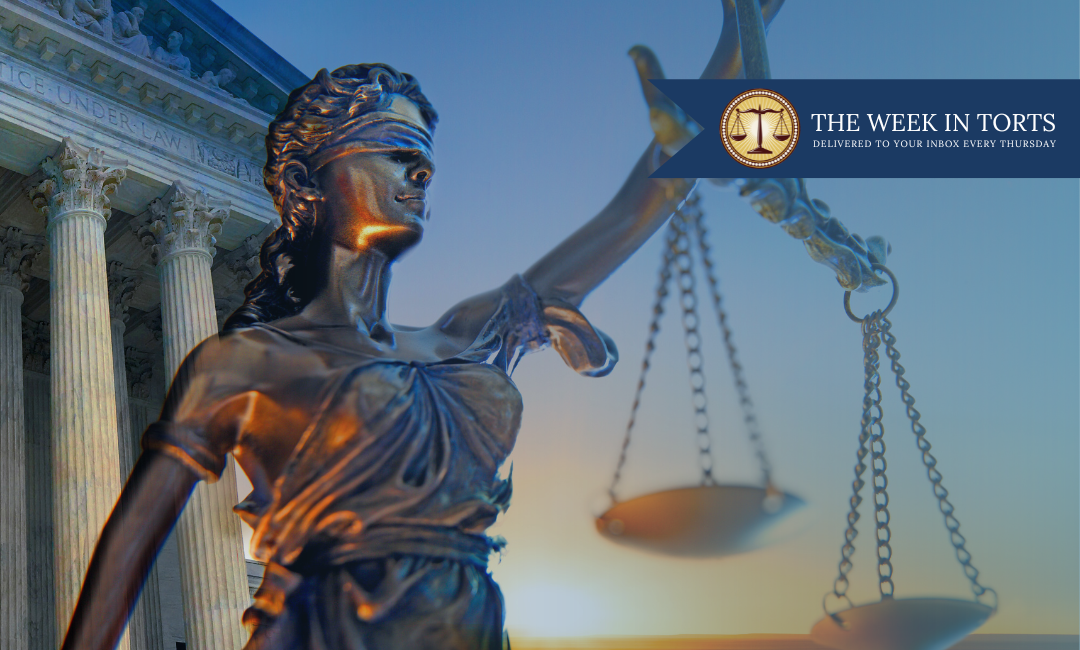The Week In Torts – Cases from December 15, 2023

One more thing to appeal early.
FLORIDA LAW WEEKLY
VOLUME 48, NUMBER 50
CASES FROM THE WEEK OF DECEMBER 15, 2023
SUPREME COURT AMENDS RULE 9.130 TO INCLUDE ORDERS DENYING MOTIONS TO DISMISS BASED ON THE QUALIFICATIONS OF CORROBORATING EXPERTS, AS APPEALABLE NON-FINAL ORDERS
IN RE: Amendment to Fla. Rule of Appellate procedure 9.130, 48 Fla. L. Weekly DS257 (Fla. Dec. 14, 2023):
Previously, on the court’s own motion, it had amended Florida Rule of Appellate procedure 9.130 to amend the list of non-final orders that are appealable to the district court, to include those denying a motion to dismiss on the basis of the qualifications of a corroborating expert witness under subsections 766.102(5) – (9).
The court has now adopted Rule 9.130(a)(3)(H) to reference section 766.102(12) articulating the qualifications of a corroborating expert witness.
Justice Labarga dissented noting that Rule amendments involving significant changes with a retroactive comment do not always reflect the most efficient or most effective way of fully incorporating the input of relevant entities.
ERROR TO GRANT PLAINTIFF’S MOTION TO AMEND COMPLAINT TO ADD CLAIM FOR PUNITIVE DAMAGES – – PROFFER INSUFFICIENT TO SUPPORT CLAIM THAT DEFENDANT’S ACTIONS CONSTITUTED EITHER INTENTIONAL MISCONDUCT OR GROSS NEGLIGENCE
McGlothin v. McDonald, 48 Fla. L. Weekly D2307 (Fla. 5th DCA Dec. 8, 2023):
The plaintiff had proffered evidence that the defendant’s placement of concrete blocks restricting drainage through a common grate, constituted intentional misconduct or gross negligence.
The plaintiff proffered nothing to suggest that the defendant had actual knowledge of the wrongfulness of her conduct, or of a high probability that it would result in harm.
Furthermore, the plaintiff’s proposed amended complaint improperly set forth his claim for punitive damages as a stand alone count. In yet another case, the court reversed the ruling allowing for the proffer.
TRIAL COURT ERRED IN GRANTING SUMMARY JUDGMENT WITHOUT STATING ITS REASONS FOR DOING SO
Florida Gulf Coast Chapter Associated Builders and Contractors v. City of St. Petersburg, 48 Fla. L. Weekly D2311 (Fla. 2nd DCA Dec. 8, 2023):
The trial court rendered final summary judgment for the City without stating why.
Considering the new standard governing the adjudication of summary judgment motions decided after May 1, 2021, it is no longer enough for a court to make a conclusory statement that there is or is not a genuine dispute as to a material fact. The rule now requires a court to state reasons for its decision, and to do so with enough specificity to provide useful guidance to the parties and appellate review.
TRIAL COURT ERRED BY GRANTING DEFENDANT’S MOTION TO STAY AND COMPEL ARBITRATION IN A WRONGFUL DEATH CASE
Costello v. Olson, 48 Fla. L. Weekly D2313 (Fla. 6th DCA Dec. 8, 2023):
The decedent was a professional baseball player who underwent a medical evaluation to determine if he was medically fit to participate in a spring training program for a professional team. The defendant and sports medicine physician performed the evaluation which revealed a certain cardiac abnormality. Still, the physician marked the player’s health as “normal” with “no further action necessary.”
Later that year, the young man was found dead in his hotel room from a cardiac arrhythmia. The autopsy found cardiac abnormalities consistent with the syndrome that the plaintiff asserted the doctor should have diagnosed.
In response to the plaintiff’s malpractice case, the physician filed a motion to stay and compel arbitration, arguing that the plaintiff’s claims were subject to arbitration pursuant to a minor league uniform players’ contract signed by the player, which incorporated a major league agreement that contained an arbitration provision.
The plaintiffs opposed the motion, asserting that the lawsuit did not fall within the scope of the arbitration provision, and that the physician waived his right to demand arbitration.
The cardinal rule of contractual construction is that when the language of a contract is clear and non-ambiguous it must be interpreted and enforced in accordance with its plain meaning.
According to the plain terms of this contract, the arbitration provision applied to disputes that were “related in any way to professional baseball” and the clubs or other major league entities. Because the terms of the arbitration provision did not encompass the plaintiff’s claims, the trial court erred in granting the defendant’s motion to stay and compel arbitration.

